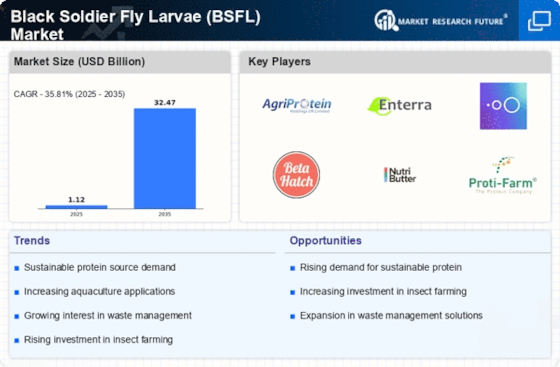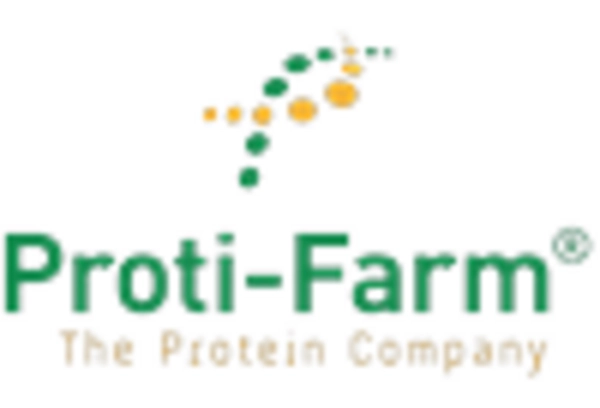Regulatory Support
Regulatory frameworks are increasingly favoring the use of Black Soldier Fly Larvae (BSFL) in various applications, which may significantly impact the market. Governments are recognizing the potential of BSFL as a sustainable protein source and are implementing policies to support its production and use. For instance, regulations that facilitate the approval of BSFL as animal feed are being established, which could enhance market accessibility. The European Union has already begun to allow the use of BSFL in aquaculture, indicating a shift in regulatory attitudes. This support is likely to encourage investment in BSFL production facilities, thereby expanding the market. As more countries adopt similar regulations, the BSFL Market could experience accelerated growth, driven by increased consumer acceptance and demand for sustainable protein sources.
Nutritional Benefits
The nutritional profile of Black Soldier Fly Larvae (BSFL) is emerging as a significant driver for the market. Rich in protein, essential amino acids, and healthy fats, BSFL are gaining traction as a superior feed ingredient in aquaculture and livestock sectors. Studies suggest that BSFL can contain up to 45% protein and 35% fat, making them an attractive alternative to conventional feed sources. This nutritional advantage is particularly appealing to farmers looking to enhance the growth rates and health of their livestock. Furthermore, the increasing demand for high-quality protein sources in animal feed is likely to propel the BSFL Market forward. As consumers become more health-conscious, the shift towards nutrient-dense feed options is expected to continue, further solidifying the role of BSFL in the agricultural landscape.
Sustainability Initiatives
The increasing emphasis on sustainability appears to be a pivotal driver for the Black Soldier Fly Larvae (BSFL) Market. As environmental concerns escalate, industries are seeking eco-friendly alternatives to traditional protein sources. BSFL, known for their ability to convert organic waste into high-quality protein, present a sustainable solution. The larvae can thrive on food waste, thereby reducing landfill contributions and greenhouse gas emissions. This aligns with the global shift towards circular economy practices, where waste is minimized and resources are reused. Reports indicate that the BSFL market could witness a compound annual growth rate of over 25% in the coming years, driven by these sustainability initiatives. Companies are increasingly investing in BSFL production facilities, recognizing the potential for profitability while contributing to environmental conservation.
Technological Advancements
Technological innovations in the production and processing of Black Soldier Fly Larvae (BSFL) are poised to drive market growth. Advances in breeding techniques, rearing systems, and waste management technologies are enhancing the efficiency and scalability of BSFL production. Automation and data analytics are being integrated into BSFL farming operations, leading to improved yield and reduced operational costs. These technological advancements not only increase the profitability of BSFL production but also ensure a consistent supply of high-quality larvae. As the industry matures, the adoption of cutting-edge technologies is likely to attract more investors and stakeholders, further propelling the BSFL Market. The potential for innovation in this sector suggests a promising future, with opportunities for enhanced sustainability and economic viability.
Rising Demand for Alternative Proteins
The growing demand for alternative protein sources is a crucial driver for the Black Soldier Fly Larvae (BSFL) Market. As consumers become more aware of the environmental impact of traditional livestock farming, there is a noticeable shift towards sustainable protein options. BSFL, with their ability to convert organic waste into high-quality protein, are well-positioned to meet this demand. Market analyses indicate that the alternative protein sector is expected to grow significantly, with projections suggesting a market size exceeding several billion dollars in the next few years. This trend is not only driven by environmental concerns but also by the increasing popularity of plant-based diets and the need for protein in animal feed. Consequently, the BSFL Market stands to benefit from this rising demand, as it offers a viable solution to the protein supply challenge.

















